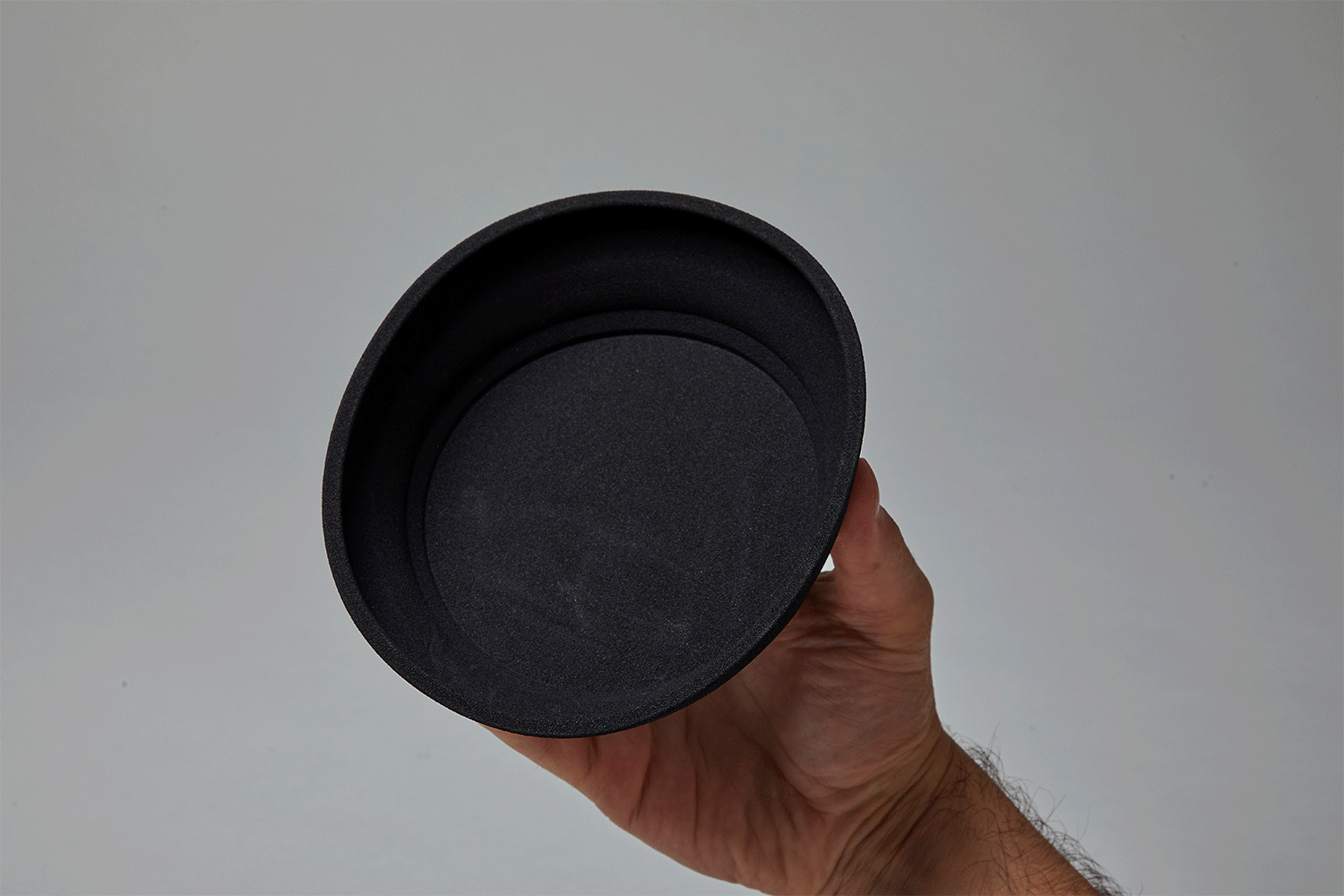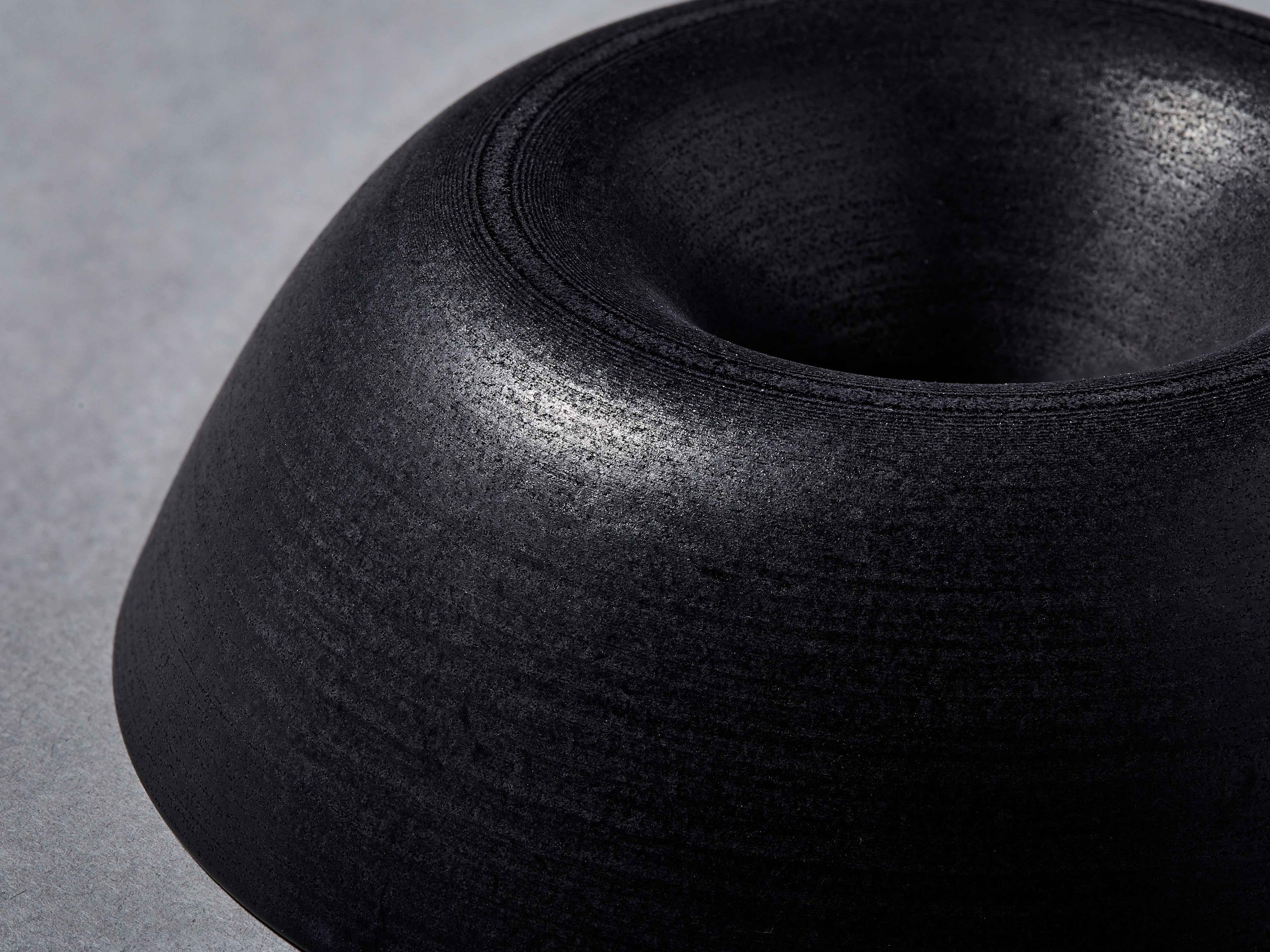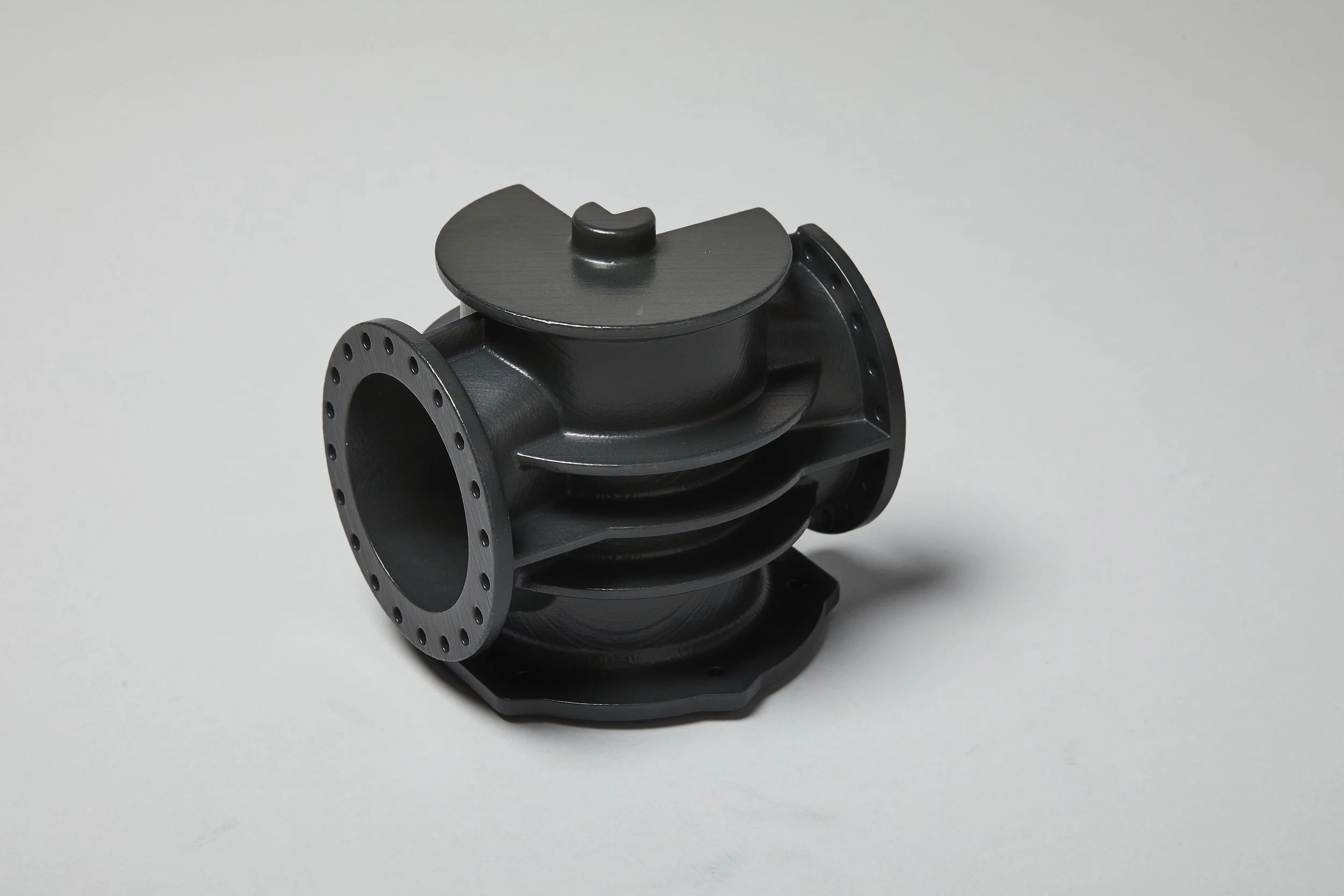Unsurprisingly, quality output from AM systems does not happen by accident. Rather, it is the result of dedicated efforts to maintain precision, consistency, reliability and repeatability throughout the entire manufacturing workflow.
CHAMPIONING ON-DEMAND MANUFACTURING AS INDUSTRIES DEMAND FASTER, MORE FLEXIBLE PRODUCTION
THE CRITICAL IMPORTANCE OF POST-PROCESSING IN AM
While AM has revolutionised part design, enabling complex geometries and rapid iteration, the raw outputs from even the most advanced AM technologies often still fall short of industry requirements. Parts often emerge from the build chamber with surface roughness, inconsistent mechanical properties, and residual powder or support structures that must be removed or refined before parts can be put to use. While AM enables direct part production, many industries require additional finishing steps to meet specific functional and aesthetic standards. The misconception that AM produces a final-use product in a single step has hindered its adoption, as companies often underestimate the necessity of thorough post-processing techniques to bring parts up to industry standards.
CHAMPIONING NEXT-LEVEL POST-PROCESSING FOR FLAWLESS ADDITIVE MANUFACTURING
With additive manufacturing, one often-overlooked factor separates cutting-edge from cut-rate — surface finish. As manufacturers push AM to production-grade levels, 3D People, a leading UK-based subcontract 3D printing bureau, is taking a stand on why surface finish is the real game-changer in AM for production applications.
CASE STUDY: 3D People 3D Printing with Zeal
Zeal Lifestyle is a sustainable lifestyle company, based in Surrey, UK; with a specific focus on stylish and highly functional and adaptable mobility aids for supported living.
The Zeal journey began when its two founders — Georgia Williams and Joshua King — independently looked into purchasing a walker for family members. Before that, though, both Georgia and Josh studied industrial design at Brunel University in London. Georgia going on to work for renowned fashion brand Dior for a number of years, while Josh garnered experience working as an industrial designer for Seymour Powell and Factory Design.
During the Covid pandemic lockdowns, Georgia’s Great Aunt, at 86 years old, needed a walker to use both indoors and outdoors to support her mobility. Despite Georgia searching for hours and hours, she could not find a stylish walker that suited her Great aunt’s stylish tastes and personality. Resistance to using mobility aids is a common obstacle for family members both in terms of denial that it is needed, but also the resentment of having to purchase a device that often looks and feels limited and unappealing.
This is what inspired Zeal Lifestyle, Georgia and Josh decided to take this matter into their own hands and design a walker putting the end user first. At the end of last year, Zeal opened for pre-orders having earned global recognition and awards for its user-centred design, including the Unlocking Potential Award by Innovate UK. The full and official launch, which will include delivery of pre-orders and opening up for direct retail options to purchase, is scheduled for Summer 2025.
The Zeal walker is coming to market following four years of collaboration with users and a comprehensive product development process, that is completely in line with what would be expected for a Class 1 medical device that has to adhere to specific ISO standards.
Zeal’s mission is to remove the stigma of walkers and mobility aids, and provide a product that users are proud to be seen with. The emotions involved in accepting the need for and purchasing a mobility aid should not be underestimated. A walker that offers elegant style and comfort, as well as being lightweight and easy to handle goes a long way towards overcoming any emotional resistance. This is the ethos behind Zeal and it shows.
However, bringing that ethos into the real world is neither quick nor easy. The product development process, by necessity for a class 1 medical device, is exacting and challenging. Safety and efficiency of the device are vital, while incorporating the essence of Zeal’s style and comfort. In addition, sustainability has also been a very important element of Zeal’s development and as a result of that commitment, the Zeal walker has been fully designed for disassembly.
For the prototyping of Zeal’s plastic parts, the Zeal team worked with 3D People. The development of the Zeal mobility aid was complex and required numerous series of functional prototypes during the iterative process that had to meet demanding requirements. The first fully functional Zeal walker prototype was made with 3D printed parts for testing size and human interactions. Utilising the Selective Laser Sintering (SLS) and MultiJet Fusion (MJF) processes offered by 3D People, along with their finishing options ensured Zeal received the high-quality parts they required reliably and fast. According to Josh: “Over the past year, we’ve ordered around 500 parts in SLS and MJF for various prototypes and design iterations. The MJF process is great for parts that need to be smooth and after post-processing, it’s hard to tell them apart from injection-moulded parts. SLS works better for visual parts since the off-white finish is more aesthetically pleasing than MJF’s dark grey. We switch between the two different processes depending on the stage of design. Costs are also important, of course, and these can also vary based on part size and process used, so that’s something we factor in too, but it’s an easy thing.”
It's hard to overstate how important quality is for functional prototypes that have to go through stringent testing. Josh continued: “The quality of the parts from 3D People has been consistently excellent. Everything we’ve received has been accurate, and there’s been very little need for extra finishing before testing. Any issues we have had were sorted quickly by the team, which has made the whole process much easier.”
When finishing of parts was required, 3D People offer multiple options including dedicated vapour smoothing, vibro-polishing and dyeing. The company also stands out for its creative approach to finishing and working with clients to get the finish they want. For the Zeal, Josh found the vapour smoothing option invaluable for a number of parts and for different reasons. He said: “Vapour smoothing gives the parts a polished look and makes them feel nicer. It also saves us from having to do extra finishing work later, which has been a big time-saver. Vapour smoothing can also give a more waterproof finish which is easy to wipe clean which was really useful for us because unfinished parts get dirty really quickly and easily, which is not ideal when undertaking multiple user tests.”
Pre-orders for the Zeal walker have exceeded expectations, according to Georgia and the company is working hard to fulfil them all ahead of the summer launch.
CASE STUDY: Tides Studios’ Shades of Identity Produced on Demand by 3D People
Additive manufacturing (AM) technologies have proved time and again that they are capable of making things and making things better. This has proven true once again with the polymer powder bed fusion (PBF) AM process for the production of stylish and original eyewear.
As a case in point, Tides Studios, based in London, has built a successful business by focusing on eyewear, specifically sunglasses, utilising polymer PBF AM and some key finishing techniques alongside a made in London business model that contributes to its sustainability goals.
Founded by Joseph Alpert, Tides Studios is a sustainable design company that originally focused on make-up and brand packaging, until it expanded into eyewear and launched its own brands and full collection of sunglasses. It also produces bespoke, made-to-order sunglasses, or ‘Shades of Identity.’
The premise that the studio adheres to is that “sunglasses go beyond their practical role of sun protection; they tap into human desires for privacy, mystery, and control over perception. Ultimately eyewear has been a large part of popular culture from the stage to dancers in the crowd and we want to be part of that evolving story.”
For Tides Studios this evolution goes even further beyond the practicalities and the style – to the means of manufacture. Eyewear is not a unique application for AM in 2025, but unique is absolutely a word that can be attributed to the Tides Studios collection as well as commissioned, bespoke sunglasses for customers that are fully enabled by additive technologies and an ecosystem of efficient finishing technologies.
According to Joseph: “The nature of additive technologies is a key enabler for how we design and empowers us to experiment freely, pushing boundaries to create eyewear that fits a diverse range of styles, faces, and preferences. Thus, for us, and many of our customers, eyewear isn’t just an accessory—it’s a platform for self-expression, reflecting both cutting-edge technology and the individuality of its wearer.”
Joseph and his team had been watching the maturation of AM technologies for a number of years and utilising them frequently for product development work. The ideas for the sunglasses had materialised 2-3 years ago, in collaboration with a fashion brand La Maskarade, but the early prototypes were heavy and not user-friendly in the slightest. The idea to use 3D printing technologies to hollow out the heavy frames was posited and tested, with functional prototype runs that resulted in the first model for the studio.
Subsequently, Tides launched the first models and garnered “a ton of interest,” according to Joseph. “It really blew up and exceeded our greatest expectations and we transitioned to an eyewear business full time about a year ago.”
The business is fully enabled by 3D printing, with Joseph’s convictions that additive technology, specifically PBF, could produce Tides original designs paying off. “Although, it wouldn’t have happened without an old man in engineering collaborating with young people in fashion,” he quipped. The development phase took time too, and Joseph and his team worked with 3D People during this time.
“We did send prototypes out to other AM bureaux early on, and there were some good results with the prints themselves. What sold us on 3D People, though, was how accommodating they were to our vision, and finding solutions that would allow us to develop the collection and move into production with them. While the PBF production process is vital, we needed more. Specifically in terms of bespoke colour options and a superior finish to every pair of glasses.”
Polymer PBF AM processes offer the best strength and flexibility for eyewear as well as enabling complex, unique and intricate designs that can be produced cost-effectively. However, finishing PBF parts that come off the machine is an essential post processing step for any application that is going to be touching the skin. PBF parts tend to have a sand-papery feel to them and can be rough, especially on the sensitive skin around the face. Smoothing and strengthening the surface finish is a must.
Indeed, 3D People were able to offer Tides Studios a unique finish solution to meet their needs in a cost-effective way. They were able to combine their in-house vibro polishing and vapour smoothing capabilities to achieve the ultimate finish. This, along with the broadest palette of colour dye options in the UK gave Tides exactly what they needed. As a result, 3D People are now completing batch production runs for Tides Studios every month, up to 500 items each time.
Felix Manley, Co-Founder of 3D People commented: “Working with Joseph and the Tides team has really cemented for us how important finishing options are for production applications of additive techs like MJF and SLS, which we run in-house at our facility in London. It is why we place as much emphasis on finishing systems as we do on the 3D printing systems. By focusing on the application, we are able to deliver the best possible finishing results, which, when you look at the Tides Sunglasses, speak for themselves.”
The London connection is an important one. All of Tides Studios sunglasses are sourced and made locally in London. This is with the single exception of the lens base, with the only factory to manufacture them based in China. However, that is sourced raw and is then cut and assembled at Tides’ Whitechapel operations. As Joseph commented: “‘Made in London’ isn’t just a label—it’s a commitment to sustainability, authenticity, and accountability in every pair of glasses we create.”
Tides Studios designs and makes sunglasses for customers from all over the world, and this includes for some recognisable names such as Beyonce for her Renaissance tour, and British stylist, Betsy Johnson.
The full collection can be viewed here.














